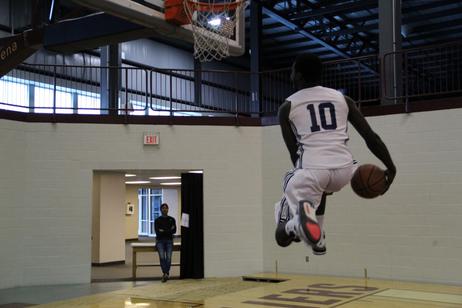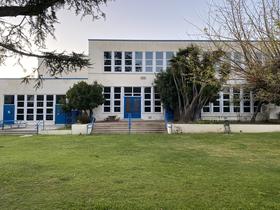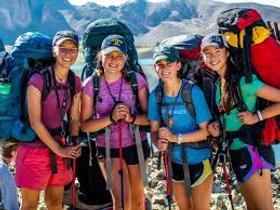Editor's note: I recently asked Bobby Bossman, Director of SPIRE Academy, to explain and outline the kind of athletic programs and training which the Institute offers. It is one of dozens of athletic institutes around the country which give young women and men the chance to see whether they have the right stuff to take it a step further. ~Rob
1. How does a specialty institute such as Spire Institute handle the balance of academics and athletic training?
By having flexibility with each student's time and the ability to create custom daily schedules, our staff can plan the most appropriate training day unique to each student-athlete. Some athletes may require more or less time in academic training based on progress. We have the ability to accommodate accordingly by infusing more academic time when needed and allowing those who are ahead academically extra periods of athletic training. This is versus the traditional high school setting that blocks students into a 7:30am-3:30pm structured school day before athletic activities even begin.
SPIRE also has the ability to condense the academic portion of the day by removing some filler blocks such as study halls and P.E. classes to allow athletes opportunities to train in the mornings as well when their bodies are physically the freshest.
How do you advise your young athletes regarding their academics?
All of our student-athletes are advised to complete all require core courses as per the National Collegiate Athletic Association (NCAA). NCAA schools require college-bound student-athlete to build a foundation of high school courses to prepare them for the academic expectations of college.
Classes that are NCAA core courses include:
- English: English 1-4, American Literature, creative writing
- Math: Algebra 1-3, Geometry, statistics
- Natural of physical science: biology, chemistry, physics
- Social science: American History, civics, government
- Additional: comparative religion, Language Courses 1-4
We also follow the guidelines to complete a passing grade on the OGT (State of Ohio Graduation Test) as well as prepare our students for success on the SAT and ACT tests through our curriculum and an additional SAT/ACT prep class.
2. Outline a typical program day for a basketball player.
A typical day for a basketball player looks as follows. We can customize our day based on preference and needs of each individual athlete:
7:30am-8:00am--BREAKFAST
8:00am-12:00pm-- ACADEMICS
12:00pm-1:00pm-- LUNCH
1:00pm-3:30pm-- TEAM PRACTICE
3:30pm-5:00pm-- PERFORMANCE TRAINING
5:00pm-6:00pm-- INDIVIDUAL SKILL WORKOUT ON COURT
6:00pm-7:00pm-- DINNER
7:00pm-7:30pm-- MENTAL SKILLS TRAINING
7:30pm--9:00pm-- STUDY HALL
9:00pm--10:30pm-- RELAX/SOCIAL HOUR IN DORMS
10:30pm-- LIGHTS OUT
3. How can parents determine whether their child has the potential to be a successful athlete?
If a child is showing dedication to their sport, defined as 2 or more hours per week day practicing and training in the school year, or 3-4 hours playing, practicing, training on the weekends, one can assume the student is very seriously motivated. Motivation is key in any endeavor athletically, because the foundations of success are built in the daily repetition of specific movements and skills. In addition, sports are a great enhancer of the academic classroom. No matter the beginning skill level of an athlete, there is much to be said about character traits learned through sports such as: persistence, working with a diverse group of teammates, following instruction, receiving feedback, and accountability/time management.
From there, all student-athletes can become successful in their own regard because each student-athlete has the ability to reach their maximum potential. While each students' maximum potential may differ, SPIRE brings out the best ability in every athlete through our programmed and individualized approach to training. Whether an athlete is already of elite caliber or in the fundamental development stages, there is a training solution and program for all to be successful.
4. What kind of supervision do you have in place for students attending your programs?
SPIRE Academy has a dedicated student services staff that monitors students 24 hours per day 7 days a week. Student Services is responsible for daily care, monitoring and transportation of all students. Our full-time staff lives in the dormitories with students and is available to parents at any time. We also have separate housing for our male and female students as well as female resident advisers. In addition, SPIRE's academic, sport coaching, sports psychology, athletic training/medical, nutrition, and performance - speed, strength, agility - staff all work in conjunction to ensure total student-athlete development.
5. Do you have experienced sports medicine professionals on call in the event of injury?
Our student-athletes at SPIRE Academy have access to a full-time Sports Orthopedic rehabilitation and surgeon office on site. In addition, our athletic trainers are present at every training session and every competition that is participated in by a SPIRE student-athlete. Keeping our athletes' bodies whole and healthy is a priority for our staff and it is evident in the way we prepare, train, and feed our athletes to help them limit the risk of injury during competition.
6. Explain why programs at SPIRE Institute are a good investment in a young person's athletic future.
SPIRE Institute is much more than just an Academy. As a world-class event center and sought after sports destination, our students are exposed to experiences that you simply can not find at other schools. With NCAA National events, Collegiate conference championships, and Olympic training held on site, our young persons' futures are impacted in ways that the traditional high school sports setting can not offer. The investment into the total development of a young athlete is paramount as their maturation time from point A to point B is very limited in the high school years. Our goal is to ensure that we provide a better future for each student that steps foot on campus because our future lies in the future success of our great young alumni on and off the court.
Questions? Contact us on Twitter. @privateschoolreview























